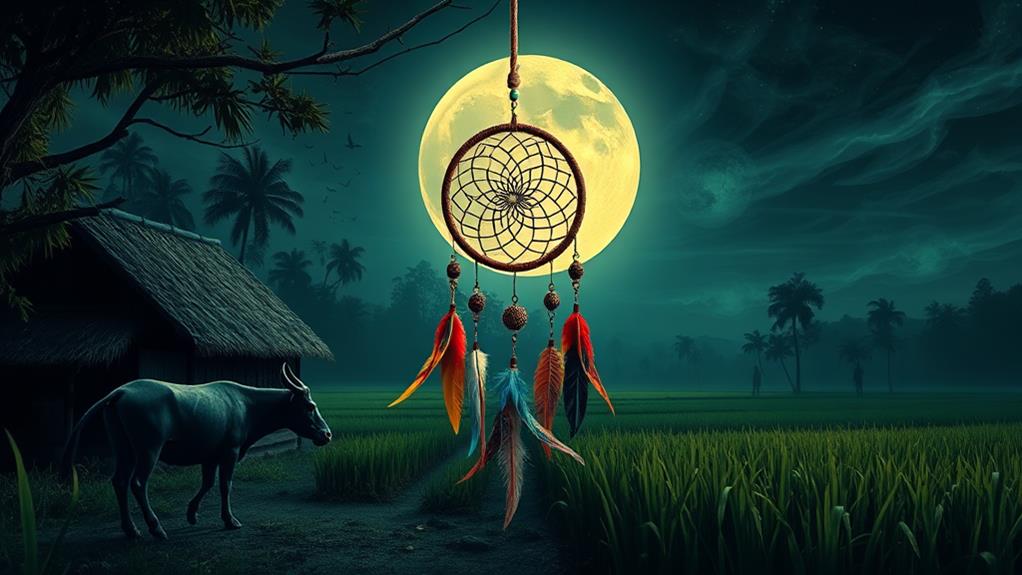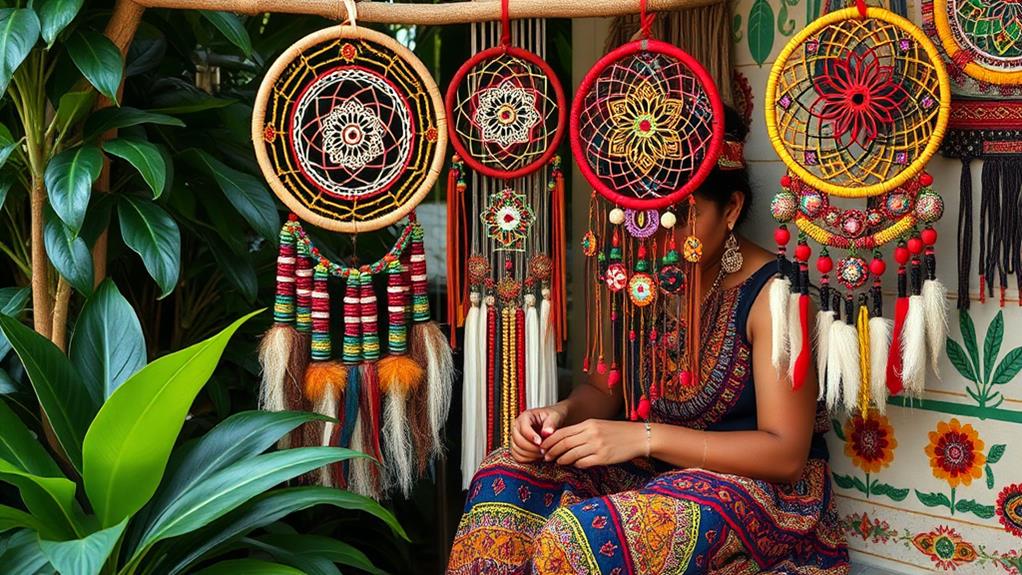Dreams are sacred messages from ancestors and spiritual entities in Filipino culture. They provide crucial guidance and are often interpreted through community discussions, where elders share wisdom about symbols like water and flying.
Water symbolizes emotions, while flying represents freedom and empowerment. These symbols carry deep emotional meanings, revealing subconscious thoughts and reflecting personal and collective experiences.
Dreams play a significant role in health practices, linking spiritual experiences to physical well-being. For instance, dreams can diagnose illnesses and guide healing practices.
This rich significance of dreams is underscored in cultural rituals and child development, highlighting their importance in Filipino culture.
Cultural Perspectives on Dreams

In Filipino culture, dreams are considered sacred messages from ancestors and deities. They aren't just nighttime visions but hold profound significance. It's common to discuss dreams in social settings, where people share and analyze them to gain spiritual insights. This communal approach fosters connection and serves as a means to seek guidance and reveal hidden truths that can help navigate life's challenges.
Filipino dreams often feature specific motifs, such as flying, water, and animals, which carry specific meanings tied to the community's values and beliefs about spirituality. For example, flying might symbolize freedom or escape, while water can represent emotions or spiritual cleansing.
Elders play a vital role in interpreting dreams, as their wisdom and understanding of ancestral knowledge are essential for grasping the deeper significance behind these nocturnal experiences. Engaging in these discussions can enrich your understanding of both your dreams and the cultural framework that shapes their interpretation, allowing you to appreciate the profound connections between the living and the spiritual realms.
Psychological Interpretations of Dreams
Dreams are a window into the subconscious, offering insights into our thoughts, feelings, and experiences. In Filipino culture, dreams are seen as a bridge between the sacred and the psychological, allowing individuals to explore their subconscious mind. This concept is supported by Sigmund Freud's theories, which suggest that dreams reveal hidden desires and fears, particularly when they involve deceased relatives.
Dreaming of a departed loved one can prompt individuals to confront personal issues or foreshadow potential loss, illustrating the connection between psychological insight and cultural beliefs. For example, a dream about a deceased family member may lead someone to reflect on their own relationships or unresolved emotions, sparking personal growth and introspection.
Nightmares can have a profound impact on an individual's psyche, as they can lead to the development of self-fulfilling prophecies based on fears, influencing daytime behaviors and mental health.
In Filipino society, discussing and analyzing dreams is a common practice that fosters community support, allowing individuals to process emotional experiences collectively.
The cultural acknowledgment of dreams' psychological significance enriches our understanding of emotions and experiences, highlighting the interplay between psychological interpretations of dreams and cultural beliefs. This perspective shapes our understanding of the profound impact dreams have on our psyche and social context, emphasizing the importance of exploring and understanding our dreams.
Spirituality and Health in Dreaming

Dreams as a Bridge to the Spirit World
In Filipino culture, dreams are believed to be a connection to the spirit world, offering insights into one's well-being. When you dream, you might be tapping into a realm where messages from ancestors or deities can guide you.
The Connection Between Dreams and Health
The absence of spirit-stuff during dreams can lead to health issues or even death. Folk healers often receive divine guidance through dreams, connecting spirituality with health practices.
For instance, if a folk healer dreams about a specific herb, they may use it to treat a patient's illness. Dreams can reveal spiritual disturbances that manifest as physical ailments. For example, a dream about a snake may indicate a spiritual imbalance that's causing a person's illness.
Communal Understanding of Dreams
Communal discussions about dreams foster a collective understanding of their spiritual implications. This collective understanding shapes health practices significantly.
When you interpret your dreams, you might find insights into your mental and physical state, prompting you to seek remedies.
The Interplay of Dreaming, Spirituality, and Health
In Filipino culture, the interplay of dreaming, spirituality, and health is profound, highlighting the importance of understanding your dreams as a pathway to holistic well-being.
Child Development and Dreams
Analyzing Dreams Fosters Emotional Growth in Children
Dream analysis cultivates emotional growth and resilience in children within Filipino culture. By discussing their dream narratives, particularly those centered on conflict or fear, children can confront and overcome insecurities. This practice not only nurtures their emotional intelligence but also enhances their ability to communicate complex feelings.
Collective Dream Analysis Fosters a Sense of Belonging
In local communities, families and friends gather to interpret dreams together, creating a supportive environment. This collective engagement fosters a sense of belonging and helps children process their experiences more effectively. As they verbalize their dreams, they develop problem-solving skills, learning to navigate their emotions and situations in a constructive manner.
The Significance of Dreams in Personal Development
The cultural belief in the significance of dreams highlights their role in personal development. By encouraging children to articulate their dreams, we provide them with a valuable tool for emotional exploration.
This process reinforces their confidence in sharing feelings and thoughts, essential skills for their growth. Ultimately, dream analysis becomes a vital practice that shapes not just individual resilience but also strengthens communal bonds within Filipino society.
Modern Theories of Dreaming

Dreams as Windows to the Subconscious
Researchers today explore how dreams serve as windows into our psychological landscapes. This concept is based on the idea that dreams can reveal hidden aspects of our minds.
Approaches to Understanding Dreams
Different approaches seek to unravel the complexities of our subconscious. Freudian interpretations suggest that dreams reveal hidden desires and fears. For example, a recurring dream about being chased might symbolize a fear of failure in waking life.
Other methods focus on emotional processing and problem-solving, where dreams help us process and resolve emotional conflicts.
Key Aspects of Contemporary Dream Theories
Lucid dreaming is a state where you become aware of your dreams, allowing you to confront personal issues.
Cultural anthropology examines how modern beliefs about dreams intersect with traditional views, such as those in Filipino culture, where dreams are believed to provide guidance from ancestors.
Emotional growth is often facilitated through dreams, providing a medium for conflict resolution. For instance, a dream about resolving a past argument might help you develop empathy and understanding.
Dream interpretation blends scientific methods with cultural narratives, emphasizing personal insights, such as identifying recurring themes or symbols in your dreams.
The Significance of Dreams
Dreams aren't just mere reflections of our thoughts but also essential tools for understanding and navigating our emotional landscape.
Common Dream Symbols in Culture
Cultural Dream Symbols in Filipino Culture
In Filipino culture, dream symbols are closely tied to personal emotions and collective beliefs. Flying in dreams represents freedom and spiritual ascension, hinting at a connection to the spirit world.
Dreams of water symbolize cleansing and purification, embodying the unknown and the potential for transformation in one's life.
Animals in Dreams
Animals also hold significant meaning in dream symbolism. A dog in a dream symbolizes loyalty and protection, reflecting one's relationships and feelings of security.
On the other hand, a snake in a dream may indicate danger or deceit, prompting reflection on trust and caution in waking life.
Food in Dreams
Food in dreams connects to nourishment and abundance, echoing the importance of social connections and community ties.
Interpreting Dream Symbols
By interpreting these dream symbols, one gains a deeper understanding of their emotional state and relationship with the spiritual realm, reinforcing cultural values and beliefs.
Dreams serve as a bridge between personal experiences and cultural narratives, offering profound insights into oneself and the world around them.
Superstitions Surrounding Dreams

Dreams and Superstitions in Filipino Culture
In Filipino culture, dreams are often believed to hold significance and are closely tied to life events, particularly misfortune or death.
Interpreting Dreams of Misfortune
Dreams of falling teeth symbolize impending misfortune or death. This belief reflects the connection between dreams and life events, guiding individuals' actions and decisions.
Warning Signs in Dreams
Seeing a voided face in your dreams serves as a warning. This dream is believed to prompt individuals to avoid certain places or take precautions to prevent misfortune.
Sharing Dreams of Death
Sharing dreams that involve death may invite more misfortune. This belief leads to a reluctance to discuss these experiences, as individuals fear that sharing their dreams may attract negative consequences.
Protective Measures
Engaging in protective measures, like biting wood after revealing ominous dreams, is common. This practice is believed to ward off negative consequences and misfortune.
Understanding Filipino Superstitions
Understanding these superstitions provides insight into the cultural fabric of Filipino society. They shape personal interpretations, foster community discussions, and reinforce shared beliefs and support systems.
Recognizing the significance behind these dream interpretations reveals how dreams influence daily life, reflecting the concerns and values of Filipino folk.
How Do Dreams Play a Role in Filipino Religious Practices and Beliefs?
Dreams play a significant role in the role of religion in filipino community. Many Filipinos believe that dreams are a way for the divine to communicate with them. Some religious practices and beliefs are influenced by dreams, and they often seek guidance and interpretation from religious leaders.
The Role of Dreams in Rituals
Dreams serve as a connection between the material and spiritual realms in Filipino rituals. In pamamanata rituals, individuals make promises to spirits in exchange for blessings, and fleeting visions become vital, offering perceived communication with the supernatural.
Dreams provide clarity and guidance, as seen in the panalangin sa panaginip ritual, where individuals seek guidance from dreams to navigate life's challenges.
Elders play a crucial role in interpreting dreams during these rituals, reflecting a deep cultural reverence for ancestral wisdom. Their insights help the community understand dream messages, enriching their collective experience.
Stories in rituals feature characters seeking spiritual guidance through dreams, reinforcing cultural narratives that bind individuals to their heritage.
Discussing dreams in a communal setting fosters a shared understanding of their significance, allowing individuals to connect with others through personal experiences and interpretations.
This exchange strengthens cultural beliefs and creates a sense of belonging. Ultimately, dreams in Filipino rituals serve not just as personal reflections but as communal touchstones, deepening ties to both the spiritual and cultural landscapes.
Dream Weaving Traditions in Mindanao

Dream Weaving: A Profound Expression of Tboli Cultural Identity
Among the Tboli people in Mindanao, dream weaving stands out as a profound expression of cultural identity and spiritual connection. This sacred practice transforms visions from the goddess Fu Dalu into intricate Tnalak textiles made from abacá fibers.
The Dream-Weaving Process
The dream-weaving process involves several key elements:
Fabrication: Tboli women separate, dry, and dye abacá fibers to create the fabric for the Tnalak textiles.
Symbolism is also crucial, as colors are used to represent purity (white), blood (red), and soil (black).
Collaboration plays a significant role, as male community members assist in preparing the fibers.
Finally, preservation efforts, such as the Lake Sebu School of Living Traditions, educate youth about Tboli culture and ensure the tradition's continuation.
The Significance of Dream Weaving
Dream weaving isn't just a personal experience, but a communal narrative woven into the fabric of Tboli identity.
This collaborative effort emphasizes the importance of community involvement in preserving cultural heritage.
As modernization threatens this tradition, the commitment to preserving dream weaving ensures that these rich cultural expressions continue to thrive, connecting generations through the threads of dreams.
Questions and Answers
What Is the Typical Filipino Dream?
Filipino dreams often involve flying, which symbolizes freedom and spiritual growth. This is because flying is a common motif in Filipino culture, representing a desire for liberation and self-improvement.
For example, dreaming of flying over mountains or oceans may indicate a need to overcome obstacles or explore new opportunities.
Water is a recurring element, representing cleansing and mystery. In Filipino culture, water is associated with purification and renewal.
Dreams involving water, such as swimming or bathing, may suggest a need for emotional cleansing or spiritual rejuvenation.
Animals appear frequently, conveying loyalty and danger. Dogs, for instance, symbolize loyalty and protection, while snakes represent danger and caution.
These animal symbols reflect deep-rooted cultural beliefs and values.
Food is a common theme, signifying nourishment and community ties. In Filipino culture, food is a symbol of hospitality and community.
Dreams involving food, such as feasting or cooking, may indicate a need for social connection or nourishment.
These dreams serve as a form of communication, guiding individuals through life's challenges and connecting them to a broader spiritual realm.
What Is the Cultural Significance of Dreaming?
Dreaming holds deep cultural significance, as it often guides our understanding of life's mysteries and connects us with our inner selves and the wider community. Through dream interpretation, we seek wisdom from elders or family members, who help us decipher the messages, warning signs, or guidance that reflect our shared beliefs and values.
Each dream carries a unique message, which can reveal insights into our personal and collective experiences.
Sharing dreams strengthens communal ties, fostering a sense of belonging and continuity. For example, in many Indigenous cultures, dream sharing is a common practice that promotes social bonding and collective understanding.
Dreams reveal cultural identity, as they often reflect our values, traditions, and historical experiences. By interpreting and sharing our dreams, we can gain a deeper understanding of ourselves and our place within our community.
Dream interpretation is a valued skill, often passed down through generations. In some cultures, experienced dream interpreters are revered for their ability to provide guidance and wisdom.
Dreams offer guidance and wisdom, helping us navigate life's challenges and make informed decisions. By paying attention to our dreams and seeking the wisdom of others, we can tap into a deeper understanding of ourselves and the world around us.
What Is the Significance of Our Dreams?
Dreams Reflect Your Subconscious Mind
Your dreams hold significant meaning, often reflecting your subconscious thoughts and feelings. This is because your subconscious mind processes and consolidates memories, emotions, and experiences while you sleep, making dreams a window into your inner world.
Dreams Provide Insights and Self-Awareness
Through dream interpretations, you can uncover insights about your fears, desires, and experiences. For example, recurring nightmares may indicate underlying anxiety, while vivid dreams about success may reveal hidden ambitions.
Engaging with these dreams allows you to connect deeper with yourself and navigate life's challenges.
Dreams Can Guide Personal Growth
What Do Filipinos Believe About the Spirits?
Filipinos believe that spirits are ancestral souls that influence their lives. These spirits often communicate with them through dreams, providing guidance or warnings. For example, if a Filipino has a dream about a deceased loved one, they might interpret it as a warning to be cautious or a sign of good fortune.
Respecting these spirits is essential, and many Filipinos consult with elders to interpret their dreams and understand the messages from their ancestors. This connection highlights the importance of maintaining harmony with the spiritual realm, as ancestors can offer wisdom and support during challenging times.